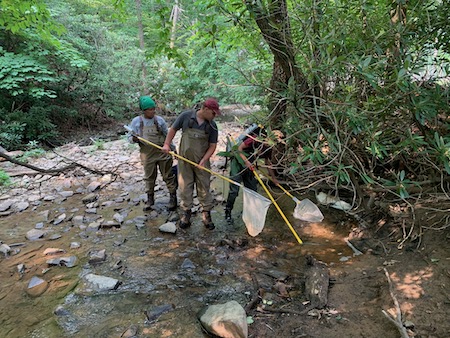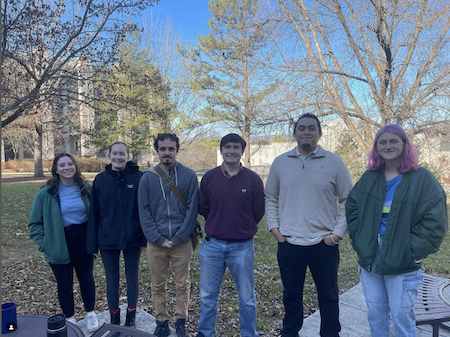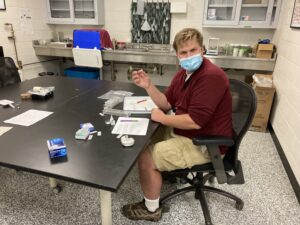Undergrads in the Lab
How do you get involved?
Undergraduates in both Fish Conservation and Wildlife Conservation that are interested in gaining exposure to research outside of the classroom are welcome in the Kindsvater lab. We are a dedicated group of scientists who can offer experience in how scientific progress is made in fish and wildlife conservation. Undergraduates in our group get out as much as they put in. The information on this page is intended to help undergraduate students understand how to get involved in the lab.
The first step is to find a graduate student mentor.
Undergraduates usually work directly with graduate students on aspects of their research projects. Email the graduate student with a brief description of your major, your interests, and your reason for joining the lab. At the graduate student’s discretion, the following opportunities may be available:-
Experiential Learning:
You can fulfill the Experiential Learning requirement for graduation in Fish and Wildlife Conservation - Note timing will be important - Please reach out a semester ahead of time • Meet with grad mentor and discuss your plan to complete an independent project
- A written summary of your project experience is due at the end to complete the departmental requirement.
• Set up expectations
• Fill out required forms and get signatures before add/drop closes
-
Research Credit:
Students can earn credits for contributing to ongoing research projects in the lab, which vary from semester to semester.
- Reach out during add/drop periods. • Signing up for research credits is more flexible than planning to fulfill the experiential learning requirement
- CNRE Advising can help you with the forms.
- Students may eventually present their research (see below)
-
Letters of recommendation
Students can list graduate student mentors or Dr. Kindsvater as references for jobs, fellowships, or graduate school. - If a letter is needed, please provide two weeks of notice.
- Dr. Kindsvater needs to know you at least a little to write a letter.
- The strongest letters tend to be written for students that attend lab meeting, and/or engage in AFS or in class.
- Please provide your resume or C.V.
-
Paid Positions
Paid research opportunities are sometimes available. Please reach out to graduate student mentors for further information. - Student wage positions are funded by Dr. Kindsvater’s grants and availability depends on funding cycles and needs of graduate students.
- REU positions (over the summer) are commonly held by students in the lab. • These are highly recommended structured research experiences.
- For students with underrepresented identities in STEM (which our department describes here), opportunities at VT include MAOP summer REU positions and Fralin Undergraduate Research Fellowships.
• They expand student participation in independent research.
-
Lab Meetings
Students in the lab are invited to attend our lab meetings. - If you are interested in graduate school, regularly attending lab meetings is the best way to understand it is like and to be exposed to research in progress.
- Students that attend lab meeting and get to know us may have the opportunity to receive feedback on job applications, professional presentations, and other research products.
- Sometimes we have donuts and coffee
-
Poster Presentations
Students involved in independent research projects usually present a poster. - Departmental conference at the end of Spring semester.
- University-wide research conference at the end of Spring semester.
- Students that see a project through to completion may be invited to attend a regional conference, such as the Tidewater AFS meeting or NEPARC .
-
Publications
Involvement in lab projects can eventually lead to authorship on a publication but this is not guaranteed. The path to publishing usually takes a year or more. Students who attend lab meeting regularly will learn more about this process; more information can be found here .



